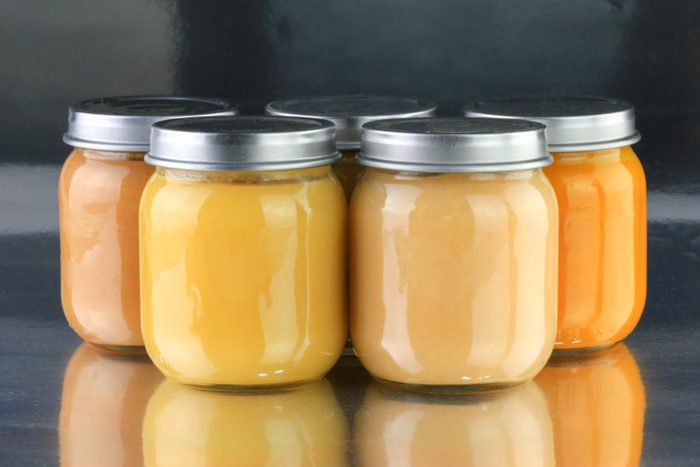New Research: This Fruit Is the #1 Worst Offender in Baby Foods With Pesticides
Updated: Nov. 15, 2023

The good news is that all 15 organic samples were free of pesticides—but advocates say this safety assurance should also stretch much farther.
When it comes to pesticides in baby food, there’s both good and bad news from the Environmental Working Group’s (EWG) latest investigation. First, the good news: The agency, a non-profit organization focused on advocating for healthier living through research, found a significant reduction in pesticides over the years in popular baby foods, with organic options being the safest choice.
Three decades ago, over 53% of conventionally grown baby food tested positive for dangerous pesticides. In the most recent tests on 58 samples, only 38% showed evidence of pesticides. In contrast, all 15 organic samples tested had no pesticides. The samples were from Beech-Nut, Gerber, and Parent’s Choice.
Among the pesticide-contaminated samples, the EWG identified nine concerning substances. Captan, a fungicide linked to intestinal damage and potential cancer, was found in 11 samples. Acetamiprid, an insecticide associated with nervous system damage, appeared in five products. Three other substances that have been shown to harm humans—fludioxonil, pyrimethanil, and imidacloprid—were also detected in several products.
Chlorantraniliprole, dodine, methoxyfenozide, and propiconazole were found in some samples, but data on their potential harm to human health is limited.
The FDA Wants To Ban a Popular Soda Ingredient That’s Already Outlawed on 3 Other Continents
While some of these substances are permitted in food in small amounts, the EWG emphasizes that babies’ bodies have not been adequately studied for these substances. Sydney Evans, EWG senior science analyst, and co-author of the report, stated in a press release, “Babies and young children are particularly vulnerable to the health risks posed by pesticides in food—and food is the way most children will be exposed to pesticides.”
The EWG report warns that non-organic apples, often not listed on the front of the package, showed the highest association with potentially damaging pesticides. Baby foods that included blueberries, pears, and strawberries, which are also included in the agency’s annual Dirty Dozen list of the most contaminated fruits and vegetables, also tended to have more pesticides.
The EWG attributes the changing pesticide ratio to advocacy and expresses hope for a future where all fruits and vegetables are free from harmful pesticides. Evans added, “Advocacy works. Any pesticide residue in baby food is concerning, but parents should feel reassured that some of the most toxic chemicals we found in our 1995 study are no longer being detected.” Chlorpyrifos, linked to brain damage and banned from all food in 2021, is one example where advocacy efforts contributed to the change.
Erin Andrews’ Journey to Motherhood After Cervical Cancer: ‘It Was a Beautiful Process’
How to choose the safest baby food
- Go organic: Organic samples were free of pesticides. Several store brands now offer organic baby food, and buying in bulk lowers the price.
- Use the Clean Fifteen and Dirty Dozen lists: Some fruits and vegetables, like avocados, carrots, and mangoes, are less associated with damaging pesticides.
- Read labels: Apples and pears may be mixed into pouches and jars even when not mentioned in the main flavor.
- Research: These 8 Body Parts Are the Biggest Entry Points for Germs and Infection
- Dieting? A New Study Found Fasting at This Hour Was More Powerful for Blood Sugar and Weight Loss Than Cutting Calories
- Here’s Why You Should Put Luggage in Your Hotel Room’s Bathtub, According to Experts
- I Ate Peanut Butter Every Day for a Week—Here’s What Happened



















